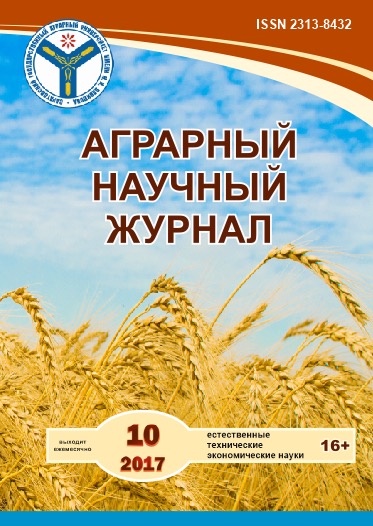EFFECTIVE FORMS OF ECONOMIC RELATIONS ON RURAL TERRITORIES OF THE SARATOV REGION
Keywords:
economic relations, effective form, household income, rentAbstract
The current state of economic relations in the countryside is in its infancy and requires improvement. In different organizational and legal forms, the specificity of rent payment for land shares differs only in the size of payments and consists in the fact that in exceptional cases effective enterprises can buy out land shares and a decent rent. It is revealed that in fact the rent is paid in kind and is poorly linked to the market value of land and the amount of tenants’ incomes. This is the potential threat of alienation of land shares in favor of third parties. For the successful development of rural areas and the replenishment of the limited budgets of rural families, it is necessary to develop and legitimize a uniform procedure and methodology of rent, which will increase the effectiveness of economic and social relations in the countryside.
Downloads
References
2. Заворотин, Е.Ф. Организационно-экономические основы развития земельных отношений в сельском хозяйстве Поволжья. – Саратов: издательство «Эмос», 2000. – 268 с.
3. Киреева Н.А., Санинский С.А., Сухорукова А.М. Трансформация АПК Саратовской области: итоги, противоречия, решения // Научное обозрение: теория и практика. – 2016. – № 2. – С. 127–139.
4. Муравьёва М.В. Методологические принципы исследования социоинфрастркутуры села // Аграрный научный журнал. – 2015. – № 10. – С. 90–94.
5. Организационно-экономические особенности производственного обслуживания предприятий агропромышленного комплекса / Л.Н. Потоцкая [и др.] // Научное обозрение: теория и практика. – 2016. – № 3. – С. 122–133.
6. Семенов С.Н., Пашков В.П. Основные направления и школы экономических исследований земельной собственности в России // Научное обозрение. – № 6 – 2012. – С. 569–576.
7. Саратовская область в 2005 и 2013 гг.: итоги опроса по анкетам «Социально-экономическое развитие в сельском районе» и «Социально-экономическое развитие сельских территорий» / А.А. Черняев [и др.]; ГНУ ПНИИЭО АПК Россельхозакадемия, Саратовская областная организация профсоюза работников агропромышленного комплекса. – Саратов: типография ИП Климов К.А., 2014. – С. 33.
8. Land relations: features of transformation in modern Russia / Е. Zavorotin [et all.] // Economic Annals-XXI. – 2017. – № 163(1–2(1)). – Р. 56–59. – URL: http://dx.doi.org/10.21003/ea.V163-12.








